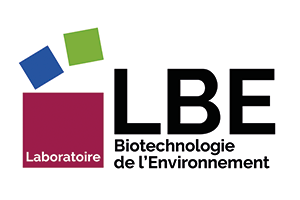

LBE
Bioengineering – Biotechnologies – Engineering – Environment – Engineering science
The component presentation
The research conducted at LBE aims to develop the concept of environmental biorefinery, which consists in treating by-products from human activities (waste, agricultural residues, effluents) and converting them into resources of industrial interest (bioenergy, biomolecules, organic soil amendments), while minimizing their environmental and health impacts.
This valorization approach explicitly integrates health safety constraintes (e.g., related to the presence of pharmaceutical residues, detergents, and/or pathogens).
LBE’s research spans a broad range of disciplinary expertise: microbiology, microbial ecology, biological engineering, process engineering, modeling, control systems, life cycle analysis, project engineering, and industrial transfer. It is recognized as one of the world’s leading laboratories in the field of anaerobic digestion.
Field of expertise
-
Dry and wet methanisation
-
Purification and valorization of liquid effluents
-
Modeling, instrumentation and control
-
Life cycle analysis and eco-design of value chains
-
Physicochemical pre-treatment
-
Fermentation
-
Platform molecules
-
Microbial resource managment
-
Bio-electrochemistry (microbial fuel cells)
-
Micro-algae
-
Health risk assessment and mitigation


BIO2E
Platform dedicated to the development of innovative solutions for the valorization and treatment of effluents and solid residues from agricultural, industrial, or urban sources. BIO2E provides resources for experimental studies, from laboratory to the demonstration phase: 3500 m2 of laboratoriesand experimental halls; state-of-art scientific and analytical equipment; and a multidisciplinary team of professionals from both academic and applied research.
Success stories - Biogaz RIO
Biogas is a renewable, easily storable, and flexible energy source, allowing stable and predictable production over both short and long terms. In France, the available biogas resources for methanation primarily come from agricultural by-products and waste from the agri-food industry (AFI) and households. To achieve the energy recovery goals by 2050, the methanation sector requires solutions to improve plant efficiency, taking into account health constraints and the fate of co-products to ensure the effective use of regional resources. Each methanation facility is a specific ecosystem that must be optimized, especially given the current trend towards regional methanation projects based on available resources.
As part of the FEDER-Region call for projects “Regional Research and Innovation Platforms,” the Biogaz RIO project (Research and Innovation in Occitanie), led by the BIO2E platform of LBE, was launched this year to provide solutions for better management of inputs and operational parameters in the anaerobic digestion process, the development of systems for the control and supervision of installations, and the maximum valorization of methanation co-products. This project brings together LBE scientists and economic stakeholders in the sector: input producers, solution providers, and operators of methanation plants.
